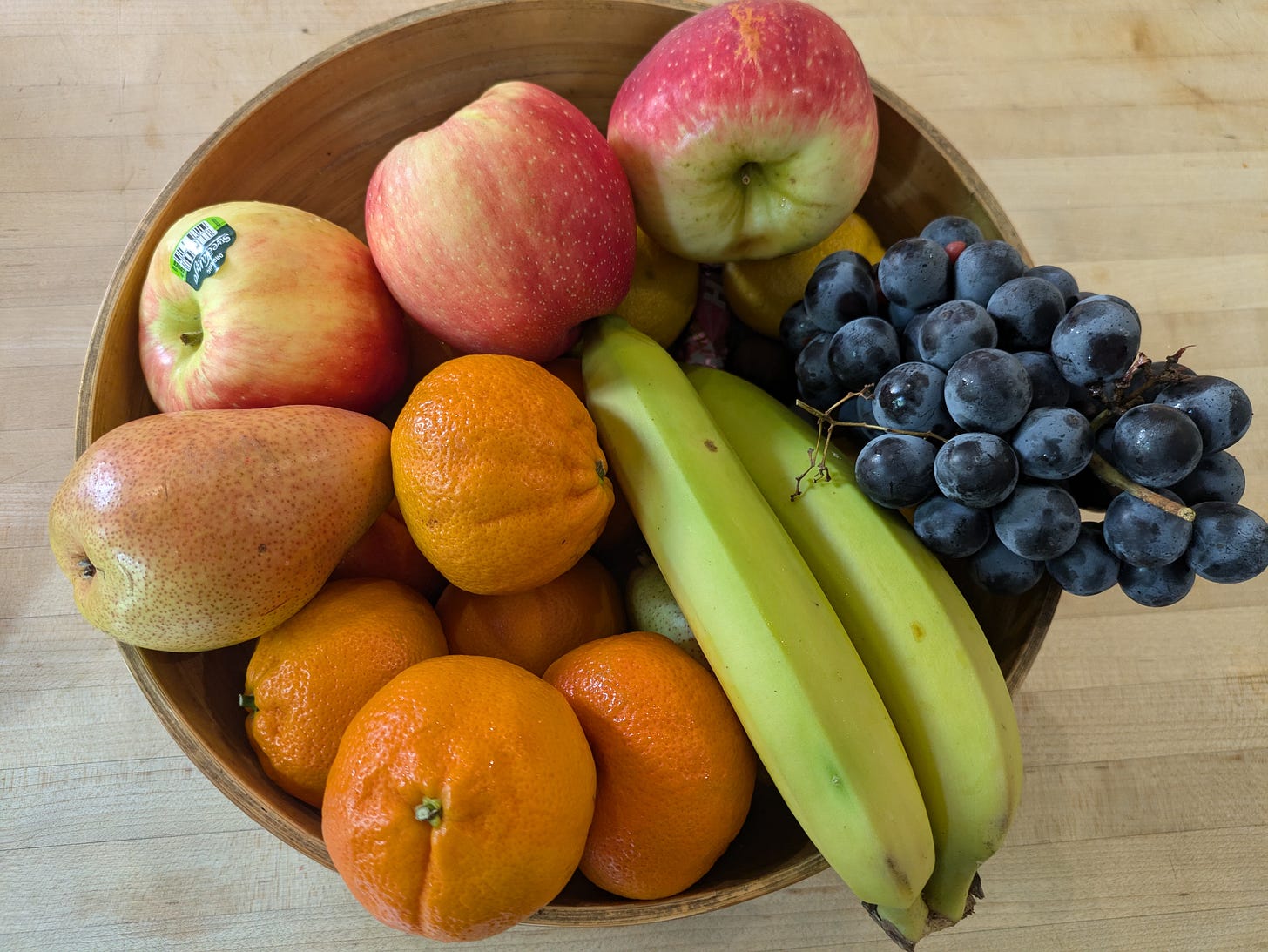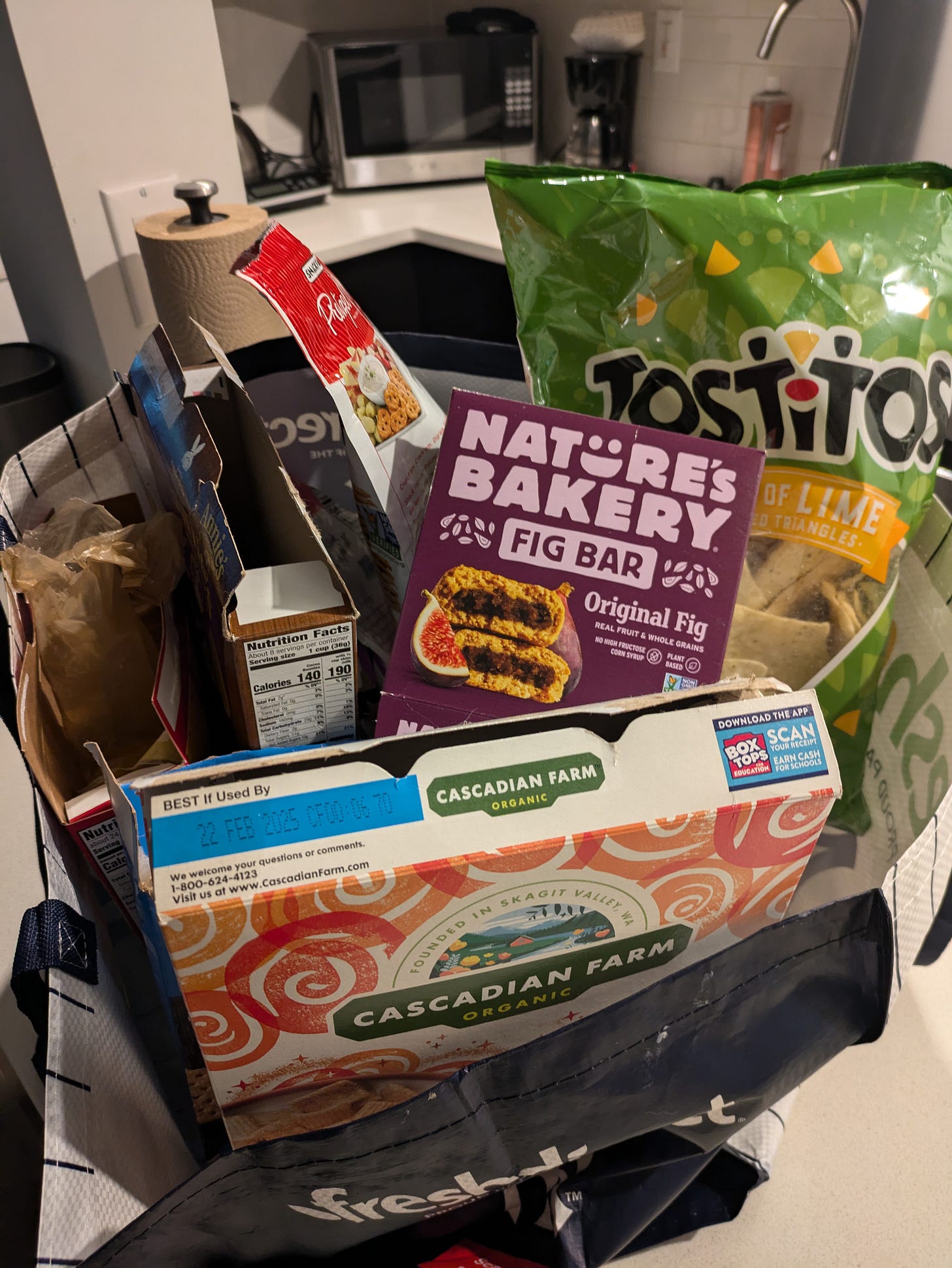Our Family's Two-Week Experiment Cutting Out Ultra-Processed Food
Balancing health, pleasure, convenience, and the planet
Cascadian Farm Organic Cinnamon Crunch. Califia Farms Pumpkin Spice Almond Milk latte. Ritz crackers. Impossible Ground Beef. Nutella. Tostitos Hint of Lime. Pirate’s Booty.
This is a partial list of foods that have been exiled to our basement since the beginning of September, when our family decided to cut out all “ultra-processed foods” for two weeks.
Now is a great time to upgrade to a paid subscription. I’m offering a limited-time 20% discount. And I’m holding a special live Zoom call for paid subscribers only - September 19 at 8pm ET/ 5pm PT. We will answer your questions about thriving and raising thriving kids in the polycrisis. Registration link is after the paywall on this post.
I’ve written before about what my family eats because it’s a set of choices we make every day that profoundly connects to both parenting and the planet.
As a mom of two female-bodied children, with my own personal eating preoccupations and issues that I’m still making peace with well into my fourth decade, I’m increasingly leery of what
has gotten me to think of as diet culture. I don’t want to promote food restriction for its own sake, or demonize certain foods.But I still want us to eat well and to keep the biosphere in mind as we do. Food is life. Food is love. Food is one way the rest of the living world enters, intimately, into our bodies. About a quarter of all fossil fuel emissions comes from food, agriculture and land use. And getting clear on where our food comes from, including some of the economics and science behind it, seems like potentially (not perfectly!) a “healthier” way to promote this kind of awareness in myself and my kids.
My husband is particularly passionate about overhauling the food system as his piece of the climate issue. He has a regenerative agriculture project upstate. And he’s the one who first brought up UPFs to the family (he may or may not have had us all listen to an audiobook about them on our Yellowstone trip).
Ultra-processed food, or UPF, is a category made famous by Brazil’s national dietary guidelines, considered some of the best in the world.
The Brazilians classify food according to four levels of processing:
1. Unprocessed or minimally processed foods (e.g. fresh fruit, vegetables, legumes, eggs, nuts)
2. Processed culinary ingredients (e.g. salt, butter, sugar, oils)
3. Processed, and traditionally preserved foods (e.g. canned fruits and vegetables, pickles, cheese)
4. Ultra-processed food and drink
The guidelines urge people to avoid everything in category 4.
The definition of UPF is somewhat subjective, but it encompasses foods that are packaged, often shelf-stable, convenient to eat, heavily marketed, and contain additives and preservatives. Things that are weird shapes, weird colors, molded, extruded, fried, coated in powders, made in factories “entirely or mostly from substances extracted from foods (oils, fats, sugar, starch, and proteins), derived from food constituents (hydrogenated fats and modified starch), or synthesized in laboratories.” Oh, and liquor, soda, and energy drinks.
UPF foods are engineered, in a lab, to be hyperpalatable. They contain lots of salt, fat, sugar, and enhanced flavors so they are extra delicious, but because they don’t usually have substantial fiber or protein, they aren’t satiating. They are “bet you can’t eat just one” kinds of foods. These foods are found everywhere, from gas stations to school lunches—by one estimate, a staggering 73% of the US food supply!
In recent years there’s been growing interest in UPF. Some big studies have come out suggesting that higher consumption of UPF increases the risk of heart disease and stroke, certain types of cancer, dementia, and type 2 diabetes. Other studies have pinpointed specific UPFs—processed meats, breads, and sodas, both diet and regular—as the source of most of the problems.
A caveat: I haven’t seen the results of these studies broken out by income. Since UPF tends to be cheaper and more widely available than fresh fruits and veggies, this might be a confounding factor.
And the reason UPFs are cheap, has everything to do with our extractive, industrialized farm system. They are manufactured out of cheap, subsidized, commodity grains—corn, soybeans, etc.
Now, “junk food is bad for you” is hardly a novel concept. But I’m intrigued by emerging science pointing the finger specifically at certain food additives, like emulsifiers and preservatives, for potentially contributing to harming our gut health and microbiome. (Too much sugar is also known to disturb the microbiome.)
The gut and microbiome, some clinicians believe, are implicated in otherwise “mysterious” systemic illnesses that are growing in incidence, like autoimmune disorders, chronic fatigue and long COVID. There is even evidence linking disturbances in the microbiome to depression and anxiety.
What’s the implication for the climate? Well, ultraprocessed foods have a higher carbon footprint than whole foods, although this difference is dwarfed by the differential climate impact of animal vs plant-based foods.
And! Tying all the themes of this newsletter together, this scientific paper published just a week ago argues
“Climate experts often overlook the adoption of nutrition via a whole plant-based diet as a solution to both mental illness and climate change…the promotion of plant-based foods has the potential to improve personal mental and physical health while improving planetary health.”
So what were the results of our two-week experiment?
Well, honestly it wasn’t that earth-shattering. We did a lot of home baking to replace packaged breads and cookies. I made some delicious energy balls with peanut butter and oats that my older kid took to school instead of granola bars. We snacked on nuts and dried seaweed. We found a local brand of ice cream without any additives and it was absolutely delicious. We also slipped up, especially when my 3rd grader hosted a sleepover for her 2 best friends and they raided all the snacks in the aforementioned basement.
I noticed how many plant based “meats” and “milks” are actually UPF. I might cut back on Impossible Burger more often in favor of beans, but I still think oat milk is worth the dipotassium phosphate.
I think my favorite part about this experiment is that we came together as a family to take on a small challenge that got us thinking more deeply about all the systems we rely on. And making the link between marketing messages on the front of a package, and unpronounceable ingredients on the back, seems like a particularly valuable piece of learning that hopefully will stick in the back of my kids’ heads as they go on to make more of their own food choices.
What’s your relationship to UPF? Love it, hate it, don’t care?
Come see me at Climate Week NYC!
I’m a moderator for the panel: "Building a Resilient Future: NY’s Climate Education Movement" on Wednesday Sept 25 at The American Museum of Natural History.
5:55 PM - 6:40 PM Register here: https://bit.ly/3Xibnav
And at 2:30 pm on Thursday, September 26, I’m presenting a “Climate Emotions Wheel” activation at this mental health-themed event : Register here: PAUSE
DOM NYC, 287 Park Ave S, New York, NY 10010
More thoughts
As I write this, my parents along with about 327,000 others in the New Orleans area are dealing with a loss of power from Hurricane Francine. This has been the second straight hottest summer on record. There have been 20 extreme weather events this year in the US alone costing $1 billion in damage or more.
There was only one question on climate in this week’s presidential debate, and Kamala Harris, during her answer, bragged about increasing fossil fuel production: “we have also increased domestic gas production to historic levels.”
“All of the above” is a fantasy.
The politics of this issue are so far from the realities that it’s enough to give you vertigo.
I look forward to electing Harris and working relentlessly to bring her and more of our fellow citizens into climate reality.
Registration link for a special live Zoom call for paid subscribers only - September 19 at 8pm ET/ 5pm PT
https://us02web.zoom.us/meeting/register/tZMpcu-oqTMqGdD7lCWAsz5T3qd5WrujFmOB








As far as Kamala and climate I'm thinking she is being as careful as can be until the election. Here is an interesting take on it from Grist. Hopefully she's hedging her bets! https://grist.org/language/kamala-harris-climate-change-freedom-patriotism-study/